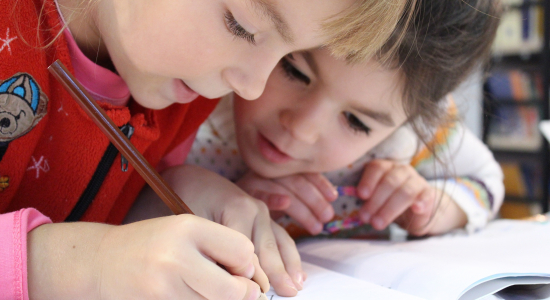
Amy
09-01-2020 om 20:59
Does my son have to go to Kabouterhuis?
I have a 4 year old son, who is turning 5 in end of January this month.
He only speaks Japanese at this moment.
I have decided to share my experience because I met a neighbor who also shared her experiences here and received a positive support.
My son has been very active, and he went to a child-care for few weeks. But my husband is at home during the weekday providing him with activities such as art, music, playing in the playground, reading, and writing.
He was at the democratic school, where he went twice a week for couple of hours. Since the teachers had issues communicating with him, one of us (parent) will be present to support with communication and also looking after him.
Recently, he switched to a Dalton school in which the 6 weeks trial has started.
Since my son cannot sit still in class, he only goes there during the play time. 3 to 4 times a week for an hour. After 2 weeks, and observation + test conducted by the psychologist the school counselor advises to take him to Kabouterhuis.
My concern is that Kabouterhuis according to the school counselor is much stricter. She gave an example saying that if you do something wrong 3 times, you have consequence. The consequence that would be given according to the counselor is not punishment. I feel that the whole system of doing something wrong 3 times, and then receiving a consequence does not meet with the education that is effective for guiding children. My concern grew as I spoke to the counselor, because I explained that parents decisions are important as much as our son's feelings and opinions.
If he opposes to going to Kabouterhuis after several trials, we will have to take him out because we do not force our son to do things that he REALLY doesn't want. But the counselor says, that you will have to just put him there. Because it is the best for him.
So now, I decided to take a step back and ask the counselor to provide a full report on the 2 week trial at the school ( which was less than 10 hours ), and also the report from the psychologist which the test was conducted non verbally.
The counselor also pointed out that my son could not sit still when they were doing activities. But now as I write and think about the whole situation, I wonder if the teacher have provided him with other activities to work on while the class went on with the language he does not YET understand. When I was attending the international school, I remember whenever the class did activities which I could not do, due to the language barrier I needed to let the teacher know and then she will give me other activities to work on... until a year after when I was able to catch up with the class.
I will continue to share with you the thoughts and experiences I am going through.

Limi
09-01-2020 om 21:48
Why do they want to send him there? Does he have a developmental delay, or because of his behavioural problems, or...?
Why hasn't he been in school since his 4th birthday, by the way? And now, only during playtime for an hour? He's not going to pick up the language much from so little exposure, so he will continue to run behind.

Leen13
09-01-2020 om 22:01
Possibilities
1. https://www.thuisonderwijs.nl/wettelijk/5onderb/
You can at your local council apply for a permit not to send your child to a school before he is 5 years old. Since your son already has been registered at a school this is a difficult one and needs immediate legal advice on a firm that is knowledgeble in homeschooling.
Arguments are that you cannot find a school that fits with your religious or otherwise beliefsystem. An other argument can be that there is no school in your neighbourhood that is informed on Dutch language learning for children with a different languagebackround. And kids can only join such a school when they are already 6 years old. The reasonable thing to do is teach your son at home in Japanese en as a sideline orient on Dutch education and provide an opportunity, a playgroup or a sport where your son can get acqainted with the Dutch language. But that is, althoug scientifically correct, not always agreed upon in school- and gouvernmentcircles.
2. Sometimes a different type of school 'Vrije School' is more inclined to permit individual differences in children. If there is this type of school in your neighbourhood
Go find one and present your case with your son there if they can see a possibility.
You blame your son's activeness and thereby disturbing factors, not following the class/teacher on his lack of knowledge of Dutch. That could be the case, but he could also be a bit to young to sit still not knowing what to do in a strict environment.
3. https://www.onderwijsconsulenten.nl/
If you have the report on your son and in writing that they want him to attend het Kabouterhuis you can ask the assistence of this counselors. They have a waitinglist but are knowledgeable of the possibilities of schooling in your area.
https://hslda.org/content/hs/international/netherlands/default.asp
4. Ask advice here. Other parents with a different languagebackground that homeschool their kids despite the not very small difficulties.
5. But you can also try to accept the advice and send your son to the Kabouterhuis. And do not stay in school with him. After a short period of getting used to school, maybe first for a few hours a day.The people who work there are more knowledgeable and who knows what advice they will give you where to go if they have observed your son.
And who knows if you go there with the report for an intake you can mention your concerns.
6. Find a psychiatrist specialized in children and in a private practice to observe your son and professionally observe if your son is just young or has e learning dissability as suggested (ADHD).
Stay on top of it. It is very timeconsuming and beware to behave kind but professional. In schools and care, especially when special education is mentioned, they can try to force you to comply by inviting Child Protective Services.
So, everything at home is fine, you are fine, your son is fine, your home is immaculate, your son has no problems, he is only somewhat young to force him to sit still.
Don't share unnecessary worries on your part with these professionals. They are not your friends or family and bound to inform CPS if they believe you are in the way of providing your son with the necessary schooling and care.
Take this very serious.

Ad Hombre
09-01-2020 om 22:34
Amy
Since you're new I think it's appropriate to warn you. While our member AnneJ undisputedly has a lot of knowledge to share, she also has some serious hangups as far as CPS and other government entities are concerned. We all know that.
It's better to take her advice with a grain of salt.

Sallie
09-01-2020 om 23:04
Why
did you stop with democratic school?
Didn't you like it there?
Mostly there is much more space there for children who act some different.

mijk
09-01-2020 om 23:18
isn't possible
to send him to a school with a schakelklas? Not speaking Dutch is enough of a barrier to behaving properly in school to not look any further until he unserstands the language. I would be very curious how he will go about in an environment where they are more used to children not speaking any Dutch.
Mijk

Leen13
10-01-2020 om 00:46
Pedagogisch beleid
https://kabouterhuis.nl/wp-content/uploads/2017/08/Beleid-veilig-opgroeien-MOC-t-Kabouterhuis.pdf
Als je op zoek gaat naar 'pedagogisch beleid' MOC het Kabouterhuis krijg je dit.
"1.InleidingKinderen hebben recht op veiligheid. Een van de belangrijkste uitgangspunten van MOC ’t Kabouterhuis is dat elk kind zich zo goed mogelijk moet kunnen ontwikkelen. Hierbij is veilig opgroeien in een veilig gezin de eerste vereiste. Wat MOC 't Kabouterhuis doet om dit zo goed mogelijk te waarborgen wordt beschreven in dit beleid Veilig Opgroeien.Als basis voor het beleid veilig opgroeien wordt verwezen naar: ‘Richtlijn kindermishandeling voor jeugdhulp en jeugdbescherming’ (NIP, NVO, BPSW, 2016) e richtlijn geeft jeugdprofessionals aanbevelingen voor het handelen bij (vermoedens van) kindermishandeling op basis van wetenschappelijke inzichten, professionele praktijkkennis en ervaringen van ouders en jeugdigen. Alle grote thema’s uit de praktijk van de jeugdprofessional die te maken (kunnen) hebben met kindermishandeling komen aan bod: -Kennis over risicofactoren en beschermende factoren-Signaleren van kindermishandeling-Het proces van wikken en wegen-Beslissen en (be)handelen naar veiligheid en herstel-De attitude en vaardigheden die dit vraagt van de jeugdprofessional-En daardoorheen: de samenwerking met en het respect voor ouders, jeugdigen en sociaal netwerk"
e richtlijn geeft jeugdprofessionals aanbevelingen voor het handelen bij (vermoedens van) kindermishandeling op basis van wetenschappelijke inzichten, professionele praktijkkennis en ervaringen van ouders en jeugdigen. Alle grote thema’s uit de praktijk van de jeugdprofessional die te maken (kunnen) hebben met kindermishandeling komen aan bod: -Kennis over risicofactoren en beschermende factoren-Signaleren van kindermishandeling-Het proces van wikken en wegen-Beslissen en (be)handelen naar veiligheid en herstel-De attitude en vaardigheden die dit vraagt van de jeugdprofessional-En daardoorheen: de samenwerking met en het respect voor ouders, jeugdigen en sociaal netwerk"
Het echte pedagogische beleid zal per Kabouterhuis verschillen en meer te maken hebben met de persoonlijke en professionele achtergrond van de diverse medewerkers. Vaak zijn er wel beleidslijnen in de zin van straffen en belonen. Het is nogal onuitroeibaar dat je bij gedragsproblemen niet uitzoekt wat het kind mankeert of niet goed zit, maar dat je het afwijst of erkent. Niet elk kind doet het daar goed op maar de medewerkers hebben het idee dat ze er iets aan doen.

tsjor
10-01-2020 om 07:39
Balance
'You can at your local council apply for a permit not to send your child to a school before he is 5 years old.'
But after his 5th anniversary, he has to go to school. That will be in a couple of days.
I'm sorry to see that your son is already tangled up in observations and diagnoses.
Maybe, if he just started at school, he would have learned fast how to to behave, just by looking at other children.
Refusing and ignoring the advice from the counselor asks for an explanation and another solution.
So now you came so far, there are not too many options: accepting the advice, or trying tot start at school, with normal hours (maybe a bit less) and without the presence of one of the parents.
ISK is for children from 12 and older. But some primary schools have special classes of special hours for children that don't speak dutch. Children learn fast by playing with other children, so most of the schools have confident in the learning capacity's of children and they let the children start in a normal class.
There are many children who don't speak dutch and there are many children who have to learn to sit still. Finding the balance between the individual who wants something, a class full of individuals who want something and a schoolsystem that wants something is a lifetime effort.
Tsjor

vlinder72
10-01-2020 om 08:11
Mijk's suggestion is a good one
Mijn friend married someone from an Africa n country and adopred her daughter after a few years they moved to the Netherlands their daughter did not speak any Dutch. The local school in the town rhe moved to suggested to place her in a class with foreign speaking childreni. She started in a class with refugee children. But this was perfect for her. Small classroom and all children had to lesrn Dutch. She enrolled half way year 6. And after year 8 she could speak Dutch and she is now in 2 Havo.
Two schools within a few months. Child not speaking Dutch, only present for a few hours a day, parents always prezent as well, not being able to sit still. It is not so odd that the school now thinks something could be wrong and your child might need help.
if you enroll in another school. Maybe you should just let him go. Just like all other children. Or is there an issue with your son and does the school have a point in sending your son to Kabouterhuis? (And to comfort you, I have heard good stories about the Kabouterhuis)

M Lavell
10-01-2020 om 08:41
Japanese or International school
"When I was attending the international school, I remember whenever the class did activities which I could not do, due to the language barrier I needed to let the teacher know and then she will give me other activities to work on... "
So why don't you send him tot an International school or even one of the Japanese schools?
As far as the regular Dutch schools are concerned, there is no other option left than Kabouterhuis. The obligation is your child has to be registered at a school within a month of his 5th birthday. If he is not, you are punishable under the Compulsory Education Act.
The Dutch school system is obliged to use this means of pressure to make you send your child to school. "Don't want to" is not an option.
But I think your right about the language barrier.
Moreover, the experience of parents with restless children is often much more positive at the International Schools.
Once he's enrolled in the International or Japanese school, you're off the hook.

Josje
10-01-2020 om 09:15
I agree
with mijk and vlinder72. Where I live there is a primary school that is the equivalent of the internationale schakelklassen. It describes itself as only offering NT2 (which means Nederlands als tweede taal = Dutch as second language) schakelklassen. Maybe there is a school like that where you live?

anoniem
10-01-2020 om 09:33
questions
Hi Amy..
What a struggle right in the beginning of the schoolperiod of your son.
I have read your post and have some questions :
You wrote :
Since my son cannot sit still in class, he only goes there during the play time. 3 to 4 times a week for an hour. After 2 weeks, and observation + test conducted by the psychologist the school counselor advises to take him to Kabouterhuis.
I wonder how this must have been for your son. After first attending the democratic school, now starting at a now school and then have to join a group for only an hour 3 to 4 times a week. Did he like it to be there?
Why was the psychologist already involved within two weeks? (Regularly it takes weeks to start a help process within school)
Have you spoken to the psycholist as well?
How can he show to sit still if he only visits during play time?
Have you received the report of the psychologist and do you agree with the results?
What value has this report after just attending this new school only for two weeks for a couple of hours?
Is he able to sit still at home ? (for example during breakfast, diner)
How long are you in the Netherlands, as your son does not speak dutch at all at the moment, I assume it has not been for long. Our experience (we have been living abroud in two different countries with different languages, when the kids were the same age), that it took the kids 3 to 4 months to be fluent in this new language. (But then they went 5 half days to school). Only exposing him for just a couple of hours might just not be enough. Also for the other children, to try to get good contact with him.
I read that the Kabouterhouse is for:
gedragsproblemen
opvoedingsproblemen
problemen rond eten, slapen, huilen en moeilijk gedrag bij zeer jonge kinderen en baby’s
autisme
hechtingsproblemen
verwerken van trauma
angststoornissen
taal- en spraakstoornissen
eetstoornissen.
(please try to translate with google translate),
Perhaps a strange question, but how well can you communicute with the teachers? Whe have experienced that our own lack of language was sometimes a problem with communicating with the teachers. Also different cultures sometimes diffused the conversation. (the teachers did not speak english, we were following language courses, but this wasn't enough at all in the beginning). Furthermore different countries have different schoolmethods. In French you start reading with 4/5 years old, in Germany they just start at 6/7 years old and they are very strict). Is there a big difference between the system you expect your son to be in compared to the dutch school system?
For which reason do they want to sent your son to Kabouterhuis? Perhaps it might give hem a better chance to learn dutch en to get accustomed to the school system and is it possible to return to school after a few months.

Biebel
10-01-2020 om 09:41
We are not telepathic
So we can’t see or judge if the Kabouterhuis is the best solution. We don’t know if your son is just having troubles adjusting to the Dutch scholar system, is having hearing problems which causes learning problems or that there is some kind of disorder, or just overprotective parents. (No offense intended).
The thing is; his teachers don’t know either. The Dutch school system thrives their pupils to be independent, working students. That they don’t need their parents and are able to communicate with their peers, teachers etc.
Obviously your son isn’t there yet. He only takes classes for an hour, is not learning Dutch; hence his teachers and their compagnons can’t see if he is capable to fit in the Dutch scholar system. They have asked for help. Help that might look a bit overdone, but is based on your son missing some capabilities. They want to help you and your son to find a reason for that.
M lavell already pointed out the options. Kids living in the Netherlands have to visit school when they are 5. If the culture shift is that much of a problem, I would definitely take the advice of finding a school with more experience with kids that aren’t aware of Dutch language. And please, understand that your kid - if he is a normal young boy- will learn Dutch quicker if he is without mam translating, making complete schooldays.
If this turns out for the good, he might turn out to help you with out language.

syboor
10-01-2020 om 10:55
My thoughts...
't Kabouterhuis is not specialized in second language acquisition. In fact, they are not specialized in language at all! They deal with behavioral problems and with "general development delays" (i.e. what used to be called "mentally handicapped").
Now, maybe there is something wrong with your child (like autism or something) that 't Kabouterhuis can diagnose and can help you with. Or maybe 't Kabouterhuis will quickly see that there is nothing wrong with your child and will chastise the school for not supporting your child properly and send him back. But that's a maybe. 't Kabouterhuis is not specialized in language problems and they are likely to be predisposed to find certain problems, and they may be WRONG about your child.
Yes, you should absolutely read the school files. Especially that psychologist's test. I suspect that a school can't just send children to 't Kabouterhuis for behavioral problems after only two weeks of short incidental school visits, and that that test is what "allows" them to send the child there. So probably your child did poorly on the test.
Your child is 4 and doesn't have to go to school yet.
My advice would be:
- get a second opinion on whatever-that-test-was that they did with your child from an independent evaluator who has experience with "non-verbal" children
- if YOU have any other "concerns" about your child's development, investigate them with an independent evaluator
- send your child to 't Kabouterhuis ONLY IF you have convinced yourself that your child's MAIN problem is behavior or intelligence related. IF you go to 't Kabouterhuis, have a meeting with them to discuss how they will give your child tools to communicate, and how they are going to distinguish misbehaviour from miscommunication.
- if you reach the conclusion that your child's main problem is the language barrier, start calling other schools.
- do NOT believe your current school's that your child has no 'other options' than 't Kabouterhuis. Every school in the Netherlands is free to accept your child (but not obligated). Look for schools that have more experience with non-Dutch-speaking children.
I know from other parents in this forum that there ARE schools out there who have no problem accepting a child who has had a problematic start at another school at 4 years old.

Flavia
10-01-2020 om 11:48
Sybor
the kid will be 5 in 2 weeks! There is not much time left until then.

Amy
10-01-2020 om 22:42
My son went to a democratic school. The classes were not structured. There were several children in his age group. In approximately half a year, all of them quit. So he was the only boy in class.
The teachers were too old to look over-energetic son like him.
You must understand, my son sleeps super well, eats organic wholesome food, no processed food, eating out in the restaurant is once in every 2 months, no junk food, etc. It's hard to compare with other children, who have eye circles, who eat crackers or bread for breakfast and lunch.
That being said, he will not sit around if he is not interested in what he sees. So he is too young to sit around if his interest is not there. I am working with him on this at home, but simply he is too young to be disciplined. He needs more time.

Amy
10-01-2020 om 22:53
Possibilities
AnneJ, I really appreciate your input and sharing with me the information and your options. The information has been very helpful for me to understand the situation and what options there may be for my son.
I am starting to understand that the Dutch school system expects young children to be independent and to know what is expected from him or her so that he or she will not disturb the system.
My son simply cannot fit in. He needs time to learn to respect others and to be respected. It may be the language barrier, but it may be that he simply wants to just play. But in school, you cannot simply play ... especially in the Dutch public school.
So I have discussions with my son on what he expects from school, and also to brief him on what the school means for him, and also others (the public).
It is a slow process but I think he is starting to understand. What options he will go for, I am not sure yet, and which schools he can be accepted and fit in ... I am not sure yet but I can definately say no to the current school.

Amy
10-01-2020 om 23:02
Balance
Tsjor, you are right. We've come a bit far, and thanks to that we are starting to realize and talk in deeper discussions on the needs and wants... and what actual options we may or we may not have.
I am very thankful for this platform because I can reflect on what is happening, also take a step back, and learn about the different educational systems, and learn about my son as well (his preferences).
The journey has only began.

Amy
10-01-2020 om 23:03
isn't it possible?
mijk, I checked and saw that there are...
However, it is from the age of 6, and not a school but a language class outside school hours?

Amy
10-01-2020 om 23:07
Mijk's suggestion is a good one
It's not like I was not letting him go.
The school asked one of us to be present to support the teachers and the student.
If you don't keep an eye on him, he will throw toys around and can be going to areas in which young children are not allowed.
There were some improvements later on regarding not going to areas in which young children are not allowed. He stopped trying to sneak upstairs.

Amy
10-01-2020 om 23:24
questions
anoniem,
Thanks for your comments. I asked for a full report after reading this from school. I just finished reading the report, which is only 2 pages, comments from 3 different teachers and the counselor.
The report was interesting because there were behaviors mentioned which we've seen our son do. For example not being able to say goodbye without tears when being dropped off at school.
On the first day, he was making sounds that drew the attention of the class.
Several things I noticed about the report, was that the observation was not made accurately. For example, my son started to enjoy school. However, he has to leave after 1 hour, but he didn't want to. So he became mean to the teacher and spat on her face. (Only happened once during the 2 weeks). At that time his father was there to pick him up, and he saw that incident so apologized to the teacher and asked my son to apologize. And my son apologized. Then, since my son was thirsty he gave water. But the teacher said you shouldn't give water when he made a bad attitude? However, the teacher did not understand that the father had already spoken to my son about the misbehavior and he also has apologized. In the report, the apologizing part was missing, and that teacher only reported: "his father came to pick him up, and the son spat on the teacher, and the father just smiled and not say anything."
I understand spitting is not acceptable. I have not seen him do that often. I do recall 6 months ago once at the previous school. Again at that time he was overly excited, and could not get what he wanted.
The teacher not being able to report accurately is not acceptable at the same time.

Amy
10-01-2020 om 23:34
We are not telepathic
You are right.
Teachers or counselors are not telepathic.
That's why it's important to talk within our family, do research, speak on this forum, and find the best way for my son's education and environment.

Amy
10-01-2020 om 23:47
My thoughts...
Syboor,
Thank you for your tip.
I am starting to imagine the impact Kabouterhuis can have on my son.
What makes this situation tough is trying to fit my son in the Dutch school system in which I believe it's like trying to fit yourself in a small hole in which you don't want to be in. But you are left with no choice because by Dutch law you have to go once you are that age.
I think I will not look around further for other public schools because all schools have similar issues.
The public school has to run within the given budget, 20+ students, with one teacher ( +/- one back up).
I will look into international schools that may suit my son...
If we can't find a school that suits my son, we may need to move.
For now, we will continue with the trial period in the current school. But at this moment I am not convinced to send my son to Kabouterhuis. I will first look into international schools.

Leen13
11-01-2020 om 00:05
Tip
Don't mention sending your son back home to anyone! Just keep it in mind just in case.

Limi
11-01-2020 om 06:20
wow
Your son sounds like a real problem case and with disruptive behaviour that you are excusing. ("I understand spitting is not acceptable. I have not seen him do that often. I do recall 6 months ago once at the previous school. Again at that time he was overly excited, and could not get what he wanted.") I don't think you really understand: you would be dead ashamed if he did this more than once. This child was older than 4 when he did it, HE should understand as well. I'm not reading anything about mental retardation, at least. And throwing toys through the class. What were the punishments/consequences/talks at home about this behaviour???
Does this child ever get told no, or get told what to do, at home?!

tsjor
11-01-2020 om 07:38
Democratic school
About the Dutch system: people can start there own school. There are al lot of restrictions, but the idea is that it should be possible for parents to find an school that is suatable for the education vision of parents. A democratic school is a rather new experience, a school that gives a lot of freedom and possibility's for children to decide what the child wants to do.
Is it a private school? A private school means that the governement does not support the school and parents have to pay for it. The governement pays for a school if the concept, the organisation, the number of pupils and the level of the teachers are checked and found oke. In the Netherlands schooleducation is free for children till 18 years.
For more information:
https://www.democratischescholen.nl/
And for the discussion about the concept: in 2018 there are some articles in newspapers that are very critical:
https://www.vn.nl/democratische-scholen/
https://www.ed.nl/veldhoven/kritiek-op-democratische-school-veldhoven-mijn-dochter-heeft-daar-niets-geleerd~ad7474d8/
Allthough the concept looks very nice, maybe this experiment is not the best start for your child.
I would not risk my childs development for such an experiment.
Tsjor

Amy
11-01-2020 om 08:01
Wow
Limi,
Yes. He is constantly explained and told
not to continue when the behavior is offensive to others.
I read in the non violent communication parenting, on one of the case study.
It was about a girl who was aged 8 or 9. She came home upset from school. Her mom did not know that she was upset. Only after when she came to the dinner table, she threw the plate full of food. The immediate reaction of the mother was not to shout and punish the daughter or start cleaning the thrown plate but to recognize the daughter's anger by first sitting down with her. The daughter was so angry that first she did not want to speak. So the mother had to cuddle her, make her sit on her lap. Eventually the child opened up and started sharing about her anger at school. After the daughter felt she was heard, she relaxed, and the mother started cleaning.
I understand spitting at someone is not nice but the way I have been addressing the issue is for my son to share with me why he got angry. And then asking him what steps we can do together to not express anger in that way.
There have been improvements so we don't see him expressing anger with a spit. But in Dutch speaking environment the spit came out because he could
not explain his emotion in the language that the teacher can understand.
In addition from the report I noticed that the teacher may lack a decent level of making observations because she missed out important points in the report.

Amy
11-01-2020 om 08:05
Tip
I agree AnneJ.
However if we cannot find an environment that does not suit my son, or he cannot adjust, going home is not an option (due to radiation issue), but we may need to move within the country or outside the country.
At this moment we have not exhausted all options so will continue to research and try out the options.
It is important to keep our minds positive. So knowing that we will not be stuck with an option my son and us parents are not in agreement with, helps me to keep moving forward.

tsjor
11-01-2020 om 08:09
Second language
'However, it is from the age of 6, and not a school but a language class outside school hours?'The way a school organizes special education for children who don't speak dutch is very different at a school. It depends on how many children there are and what kind of experience a school has with education in second languages.
It might be that a school decides to start with special education form the age of 6, because the children from 4 and 5 do not learn language by teachers and lessons, but they learn it fast by playing with other children, listening to the teacher, singing songs etc. Implicit learning is better for the language than explicit learning. For children. For adults, there is still al lot of discussion.
At the age of 6 children start leraning to read and write. For children with dutch as a second language, this might be something that needs extra attention.
If the lessons are during normal schooltime, and in or outside the school is something that a school can deside how to organise.
If a school has some system for education in second language, than they have at least attention en some experience with children who don't speak dutch.
I'd think that is at least one point.
If the school is payed by the governement, then you can save a lot of money and use that for other things for your child, like music education, sport playing chess or something like that. In the Netherlands 'payed by the governement' does not mean the governement has aproved the concept etc. It may be that the school has a board that is not governemental. Only 'public' schools have a board that is governemental. Other schools are what we call 'bijzonder'. Translated it would say 'special', but 'special'= speciaal means in our system that a school is ment for children with special needs (fysical problems, or behavioral problems or learning problems). Parents van't get there child on a 'speical' school. They have to try a 'normal' school first and then get a lot of documents from school and specialist that confirm the need for a special school for this child.
Tsjor

tsjor
11-01-2020 om 08:15
Input
AnneJ gives information that is coloured by her own experience with children with special needs (autism for example). It is usefull if you are convinced that your child has special needs. Or if specalists and reports from school think your child has some problems, more problems than just the language.
Tsjor
Reageer op dit bericht
Op dit topic is al langer dan 4 weken niet gereageerd, daarom is het reageerveld verborgen. Je kan ook een nieuw topic starten.
































